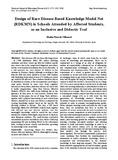Mostrar el registro sencillo del ítem
Design of rare disease based knowledge model net (RDKMN) in schools attended by affected students, as an inclusive and didactic tool
| dc.creator | Pérez de Villarreal Zufiaurre, Maider | es_ES |
| dc.date.accessioned | 2019-11-12T13:50:16Z | |
| dc.date.available | 2019-11-12T13:50:16Z | |
| dc.date.issued | 2018 | |
| dc.identifier.issn | 2332-3205 | |
| dc.identifier.uri | https://hdl.handle.net/2454/35358 | |
| dc.description.abstract | Rare diseases (RD) are those affecting at least 1 of 2.000 inhabitants. Many RD, induce disabling conditions and those school age affected children usually miss classes due to the complicated diagnostic procedures and the several medical treatments they need, thereafter. It is still unknown the exact number of students in this situation in Navarra (Spain), although according to data from the INE [16], there should be at least 1300 children with disabilities from which at least 372 children in school age could be RD affected. These students should be able to be identified in schools, as the vast majorities need help at some point, derived in some cases from cognitive deficiencies but in others, from their absence of classes due to health complications. Some Rare Disease Affected Students (RDAS) also suffer from bullying due to the ignorance of their peers or even teachers, towards their situation. In this paper, the use of Cmap Tools software, together with a planned intervention in each school from Navarre, attended by at least, one RDAS, is proposed for creating knowledge models based on the specific RD affecting children in Navarre. This way, a RD based Knowledge Model Net (RDKMN) could be built, together with affected and non affected students, and this meaningful knowledge could be useful for any school attended by children suffering the same disease in Spain or other European countries. This could become a powerful international inclusive and didactic tool, which could help normalizing RD and including RDAS in the educational field, creating inclusive schools, and therefore spreading the knowledge to the social field. | en |
| dc.format.extent | 11 p. | |
| dc.format.mimetype | application/pdf | en |
| dc.language.iso | eng | en |
| dc.publisher | Horizon Research Publishing | en |
| dc.relation.ispartof | Universal Journal of Educational Research, 6 (7): 1575-1585, 2018 | en |
| dc.rights | ©2018 by authors, all rights reserved. Authors agree that this article remains permanently open access under the terms of the Creative Commons Attribution License 4.0 International License | en |
| dc.rights.uri | http://creativecommons.org/licenses/by/4.0/ | |
| dc.subject | Knowledge model net (KMN) | en |
| dc.subject | Rare disease affected students (RDAS) | en |
| dc.subject | Meaningful learning | en |
| dc.subject | Inclusive and didactic tool | en |
| dc.title | Design of rare disease based knowledge model net (RDKMN) in schools attended by affected students, as an inclusive and didactic tool | en |
| dc.type | info:eu-repo/semantics/article | en |
| dc.type | Artículo / Artikulua | es |
| dc.contributor.department | Psicología y Pedagogía | es_ES |
| dc.contributor.department | Psikologia eta Pedagogia | eu |
| dc.rights.accessRights | info:eu-repo/semantics/openAccess | en |
| dc.rights.accessRights | Acceso abierto / Sarbide irekia | es |
| dc.identifier.doi | 10.13189/ujer.2018.060718 | |
| dc.relation.publisherversion | https://doi.org/10.13189/ujer.2018.060718 | |
| dc.type.version | info:eu-repo/semantics/publishedVersion | en |
| dc.type.version | Versión publicada / Argitaratu den bertsioa | es |



